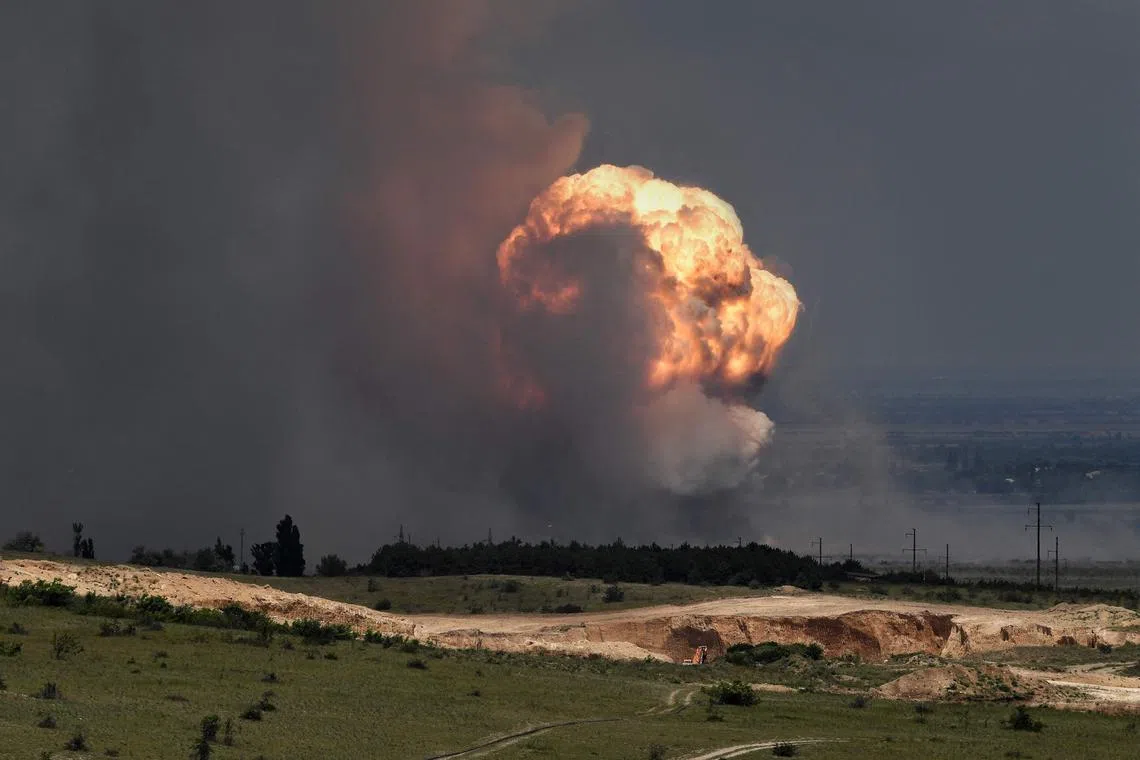Russia delivers Black Sea shipping warning as Ukraine decries ‘hellish’ port attacks
Sign up now: Get ST's newsletters delivered to your inbox

A port grain loader burns after it was damaged during Russian missile and drone strikes, in Ukraine's Odesa region.
PHOTO: REUTERS
KYIV - Russia warned that as of Thursday, any ships sailing to Ukraine’s Black Sea ports would be seen as potentially carrying military cargo, as Kyiv accused Moscow of carrying out “hellish” overnight strikes that damaged grain export infrastructure.
Russia attacked the Odesa region for the third consecutive night, the United Nations to warn that it risked creating hunger around the world.
A man was killed and a Chinese consular building was damaged on Thursday, Ukrainian officials said.
The regional governor, Mr Oleh Kiper, posted a photograph showing at least one broken window at the Chinese consulate in the Black Sea city of Odesa, but there was no sign of any other damage.
Beijing, a Russian ally, did not immediately comment on the incident, one day after Ukrainian President Volodymyr Zelensky said 60,000 tonnes of agricultural products destined for China had been destroyed in an attack on another Ukrainian port city.
Moscow said it carried out “retaliatory strikes”.
Ukraine’s military said Russian forces launched 19 missiles and 19 drones overnight, and that five of the missiles and 13 of the drones were shot down.
“Russian terrorists continue their attempts to destroy the life of our country,” Mr Zelensky said on the Telegram messaging app. “Together, we will make it through this terrible time, and we will withstand the attacks of Russian evil.”
In Odesa, a security guard was killed and at least eight others were hurt, including a child, Mr Kiper said.
Nineteen people were hurt in the city of Mykolaiv, and several residential buildings were damaged, regional governor Vitaliy Kim said.
Firefighters in Mykolaiv tackled a huge blaze that left a three-storey residential building without its top floor. Adjacent buildings were gutted by fire.
Grain terminals were damaged, as well as an industrial facility, warehouses, shopping malls, residential and administrative buildings, and cars.
Flames and smoke rose from shattered warehouses in video footage released by the Emergencies Ministry, which also showed a residential block with shattered windows.
Russia on Wednesday said it would consider all ships travelling to Ukraine’s Black Sea ports as potential carriers of military cargo, starting from midnight Moscow time (5am on Thursday, Singapore time), following the end of the grain deal.
Russia’s Defence Ministry said flag states of ships travelling to Ukrainian ports would be considered parties to the conflict on the Ukrainian side.
The ministry did not say what actions it might take. It said Russia was also declaring the south-eastern and north-western parts of the Black Sea’s international waters to be temporarily unsafe for navigation.
In response, Ukraine’s Defence Ministry said on Thursday it would consider all ships travelling to Russian ports and Ukrainian ports on the Black Sea occupied by Moscow as potential carriers of military cargo from Friday.
The ministry said in a statement that the Ukrainian armed forces had the means to repel what it called Russian aggression at sea.
The International Monetary Fund on Wednesday said Russia’s exit from the deal threatens to increase global food insecurity and could raise food prices, especially in poor countries. In Chicago, US wheat prices soared on the latest developments in the war.
President Vladimir Putin said Western nations had “completely distorted” the expired deal, but said Russia would immediately return to it if all its conditions for doing so were met.
‘Mass revenge strike’
On Tuesday, Russia said it had hit military targets in two Ukrainian port cities overnight as “a mass revenge strike” for a blast that damaged its bridge to Crimea, the peninsula it seized from Ukraine in 2014.
Ukraine’s air force said on Wednesday that 63 missiles and drones were launched across the country by Russia, mainly focused on infrastructure and military facilities in the Odesa region.
Air defences shot down 37 of them, it said, a lower proportion than it has usually reported over months of attacks.
A considerable part of the grain export infrastructure at Chornomorsk port, south-west of Odesa, was damaged, said Agriculture Minister Mykola Solskyi, adding that 60,000 tonnes of grain had been destroyed.
The attack was “very powerful, truly massive”, said Mr Serhiy Bratchuk, spokesman for the Odesa military administration, in a voice message on his Telegram channel on Wednesday.
“It was a hellish night,” he said.
Ukraine’s southern military command said Russia had used supersonic missiles, including the Kh-22 that was designed to take out aircraft carriers, to hit Odesa’s port infrastructure.
The Odesa region’s three ports were the only ones operating in Ukraine during the war under the UN-brokered Black Sea Grain Initiative that allowed Ukrainian grain exports through a Russian blockade of Ukraine’s ports.
In Crimea, a fire at a military training ground in the Kirovske district

Ammunition detonates during a fire at a military training field in the Kirovske district of Crimea.
PHOTO: AFP
Telegram channels linked to Russian security services and Ukrainian media said that an ammunition depot was on fire at the base after a Ukrainian overnight air attack.
Odesa’s military administration spokesman Bratchuk posted two videos of a fire in an uninhabited area, saying, “Enemy ammunition depot. Staryi Krym.”
Staryi Krym is a small town in Crimea’s Kirovske district.
Ukrainian forces launched a counter-offensive
In Washington, the Pentagon announced additional security assistance
The UN has said there were a “number of ideas being floated”
Ukrainian Prime Minister Denys Shmyhal, meanwhile, said on Thursday that a proposal by Poland to extend a ban on Ukrainian grain exports was an “unfriendly and populist move”.
“During this critical time, Poland intends to continue blocking the export of UA (Ukrainian) grain to the EU. This is an unfriendly and populist move that will severely impact global food security and Ukraine’s economy,” he wrote on Twitter.
Five central European countries want a European Union ban on Ukrainian grain imports to be extended at least until the end of the year.
The ban is set to expire on Sept 15. REUTERS


